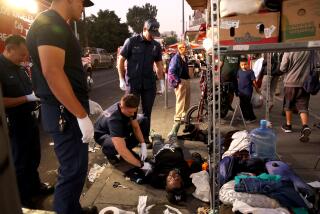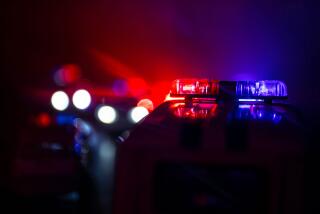LAFD dispatchers waste time getting 911 callers to start CPR
Los Angeles Fire Department dispatchers waste valuable time getting 911 callers to start CPR on cardiac arrest victims, often beginning the life-saving procedure after the point at which brain death begins, according to an internal study obtained by The Times.
The study raised particular concerns about time-consuming scripted questions dispatchers are required to ask, including one that forces frantic and confused callers to make difficult judgments about a victimâs breathing. LAFD call handlers must work through a series of pre-written questions and responses before they can give CPR instructions and dispatch rescue units, which can add to delays, the report says.
In one 911 call highlighted in the report, a dispatcher asks a caller five times whether a patient in cardiac arrest is breathing. More than a minute and 18 seconds into the call, the dispatcher still is trying to clarify the patientâs condition, prompting the caller to inquire: âAre the paramedics on their way?â
The findings shed new light on a vital but rarely measured performance standard. Cardiac arrests account for only 2% of LAFDâs 911 calls, but are among the most time-sensitive emergencies. When the heart stops beating, irreversible brain damage can begin after four minutes.
The LAFD study found that chest compressions were started in only 31% of 166 cardiac arrest calls handled by dispatchers in October, partly because some callers were unwilling or unable to perform CPR. But in cases in which chest compressions were begun, dispatchers took on average 4 minutes and 12 seconds to get the procedure started. The longest delay was more than 7 1/2 minutes.
âSpeed is everything,â says the report, which was obtained under the California Public Records Act. âWithholding or delaying [CPR] may result in a potentially preventable death!!â
The internal study was presented to dispatchers in July, not long after The Times analyzed more than 1 million LAFD dispatches and reported that the agency lagged well behind national standards for sending rescuers to medical emergencies.
The department has come under intense scrutiny after top fire officials admitted publishing statistics showing crews arrived at medical emergencies more quickly than they actually did. Revised department reports show slower response times, but even the corrected figures were described as unreliable by a data expert brought in by Mayor Antonio Villaraigosa.
The cardiac arrest study recommends eliminating some questions in the software used by dispatchers so they can get CPR started faster and rescuers on the road more quickly.
The findings are endorsed by the departmentâs medical director, Dr. Marc Eckstein, who oversaw the study. He said dispatchers need to be much quicker giving CPR instructions, ideally starting the process within 90 seconds, nearly three times the average pace found in the departmentâs study.
âItâs going to improve patient care and save lives,â Eckstein said.
LAFD has made significant strides in improving its emergency care, he said. Paramedics succeed in restoring a heartbeat to cardiac arrest victims twice as often as they did in years past, and over the past decade at least 27 patients have survived because of defibrillators placed in public areas across the city, he said.
Comparing LAFD performance to other jurisdictions is difficult because data gathering is inconsistent and reliable research is limited, experts say. But in King County, Washington, regarded as a leader in cardiac arrest response, dispatchers coax callers into performing CPR in close to half such calls â a rate 50% better than LAFD.
Research shows dispatchers should be trained to be âborderline aggressiveâ and prod callers to begin CPR as fast as possible, said Dr. Comilla Sasson, who studies cardiac arrests as an assistant professor at the University of Colorado Department of Emergency Medicine.
âThe science is definitely behind this,â she said.
LAFD delays in starting CPR are partly the result of rules requiring callers to determine whether victims are breathing. Experts say that can be a difficult task in cardiac arrests because patients sometimes suddenly gasp in a way that can be mistaken for normal breathing.
That challenge was underscored in 911 calls critiqued in the LAFD study. They included the incident in which the caller was asked five times about the patientâs breathing.
âIs he breathing?â the dispatcher asks
âHeâs breathing,â the caller replies.
âOK, so he lost consciousness for a short period?â
âYes he did.â
âOK. Is he breathing completely normal at this time?â
âUm, heâs taking short breaths, weâre not really sure his chest is rising or anything,â the caller says.
âWhat do you mean you donât see his chest rising?â the dispatcher asks.
âHeâs not breathing like normally.â
âSo either heâs breathing or heâs not,â the dispatcher says. âIs his chest rising at all?â
The caller says that the victimâs âpigmentation on his skin is changing colorâ and that he is getting pale and cold. The dispatcher asks two more times about the victimâs breathing.
Finally, the caller asks if paramedics have been sent.
âUntil I get through getting the information that I need, sir, weâre going to have to wait until that happens,â the dispatcher answers.
The report did not say whether the victim survived, but it did say the dispatcher was too hesitant and initially failed to diagnose the problem quickly enough, given the information provided by the caller.
Software used by LAFD dispatchers requires answers to be entered for each question before they can proceed. Veteran LAFD dispatcher Robert Ashley said he sometimes wishes he could bypass questions and act quicker.
âWeâre asking all these questions that really donât get us anywhere,â said Ashley, a paramedic who trains new dispatchers.
The report agrees that some of the questions should be streamlined. But changing the system will not be an easy fix, Eckstein said.
The department needs to gather more data showing questions are slowing CPR to persuade its vendor to change the dispatch software, he said.
âItâs like saying I want them to change Microsoft Office for my company,â Eckstein said.
Read the full LAFD report and listen to more 911 calls here.
More to Read
Sign up for Essential California
The most important California stories and recommendations in your inbox every morning.
You may occasionally receive promotional content from the Los Angeles Times.













